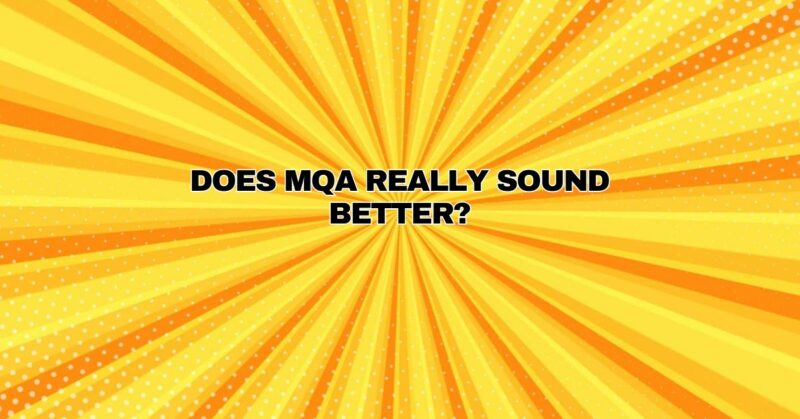MQA, short for Master Quality Authenticated, is a relatively recent audio format and technology that has generated a fair amount of buzz and debate in the audiophile and music streaming communities. Promoted as a means of delivering studio-quality audio to listeners, MQA has its proponents who claim that it provides a superior listening experience. However, it’s essential to delve deeper into the technology, its potential benefits, and the nuances of audio quality perception to determine whether MQA truly sounds better.
Understanding MQA:
MQA is an audio codec and format developed by Meridian Audio, aimed at preserving the highest possible audio quality during recording, mastering, and playback. It employs a combination of lossless compression and other techniques to deliver high-resolution audio files in a more efficient package. The key features of MQA include:
- High-Resolution Audio: MQA is capable of delivering high-resolution audio, often at 24-bit/96kHz or higher, which surpasses the quality of standard CD audio (16-bit/44.1kHz).
- File Size Efficiency: MQA achieves high resolution while maintaining relatively compact file sizes, making it suitable for streaming and downloading.
- Authentication: MQA includes an authentication feature that confirms the audio’s provenance, ensuring that it has not been tampered with or altered in any way.
- Foldable Format: MQA files are “foldable,” meaning they can be played on standard equipment without loss of audio quality, while unfolding to higher resolution when played on MQA-compatible devices.
The MQA Debate:
The debate surrounding MQA’s audio quality primarily revolves around the following arguments:
Proponents of MQA Argue:
- Higher Resolution: MQA offers audio quality that surpasses standard CD quality and provides a more detailed and immersive listening experience.
- Compact File Sizes: MQA’s efficient compression allows for high-resolution audio files that are smaller in size compared to other high-resolution formats, making them easier to stream and store.
- Provenance and Authentication: The authentication feature ensures that listeners are receiving the music as intended by the artist and mastering engineer, reducing the risk of piracy or unauthorized alterations.
Critics of MQA Contend:
- Perceived Gimmickry: Some critics view MQA as a marketing ploy, arguing that the perceived improvements in audio quality are subtle and may not justify the technology’s adoption.
- Limited Hardware Support: To fully experience MQA’s benefits, listeners need specialized hardware or software, limiting its accessibility.
- Subjectivity: Audio quality perception is highly subjective, and what sounds “better” can vary from person to person. The differences between MQA and other high-resolution formats may not be significant enough for all listeners to notice.
Subjectivity in Audio Quality:
The subjective nature of audio quality perception is a critical factor to consider. While MQA may offer technical advantages in terms of resolution and authentication, whether it “sounds better” ultimately depends on individual preferences, the quality of playback equipment, and the listening environment.
Listeners with high-end audio systems and trained ears may be more likely to discern the nuances in audio quality provided by MQA. In contrast, casual listeners using standard headphones or speakers may not experience a substantial difference in audio quality compared to other high-resolution formats.
Conclusion: Is MQA Worth It?
Whether MQA truly sounds better is a matter of personal judgment and the context in which it is used. For audiophiles seeking the utmost in audio quality and who have the necessary hardware to support MQA, it may be a worthwhile choice. However, for the average listener, the differences in audio quality between MQA and other high-resolution formats may be subtle and not justify the potential limitations and costs associated with MQA-compatible equipment.
Ultimately, the decision to embrace MQA should be based on your specific audio preferences, listening setup, and whether you value the additional features it offers, such as authentication and file size efficiency. As with any audio format or technology, the “better” choice is subjective and varies from person to person.


